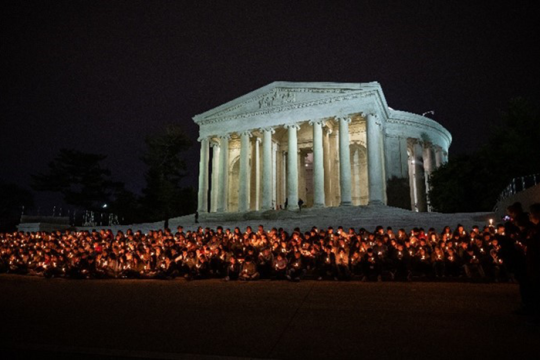Last night, 9 people were killed at the historic Emanuel African Methodist Episcopal Church in Charleston, South Carolina when a 21 year old man opened fire. The tragedy has shaken the country and reminded us that violence and hatred know no boundaries, and can reach us even within the walls of a house of worship. RAC Deputy Director Rachel Laser shared the following statement:
We are heartbroken by last night's attack at Emanuel African Methodist Episcopal Church in Charleston, South Carolina. Our thoughts and prayers are with the families of those whose lives were taken, those who were injured, and with the entire community that has been traumatized by this violence. For all congregants – from the youngest children in religious school, to young professionals engaged in religious life, to long-time stalwarts of the community – houses of worship are places of safety, comfort and inspiration. For the Emanuel African Methodist Episcopal Church to have become last night a place of such horror tears at the heart of every person of faith and goodwill. We are pleased that the police have identified and captured the suspect. Prior to the arrest, Charleston police Chief Greg Mullen has asserted that this attack is a hate crime. If so, we reaffirm that religious intolerance, racial discrimination and hate-motivated violence have no place in our society, which aspires to be a haven for people of all faiths, races and ethnicities. This attack also serve as yet another tragic reminder of the violence wrought by guns, which fall too easily into the hands of those who seek to cause grievous harm. Our Jewish tradition teaches: "He who takes one life it is as though he has destroyed the universe" (Mishnah Sanhedrin 4:5). Today we stand shoulder to shoulder with our brothers and sisters in the African Methodist Episcopal community as we pray for those who were murdered and send our thoughts and strength to the families of the victims and those who were wounded.One of the victims of the tragedy was state senator and Reverend Clementa Pinckney. Rabbi Stephanie Alexander of Kahal Kadosh Beth Elohim synagogue in Charleston reflected in an email to KKBE congregants that Rev. Pinckney “was a very special colleague in the interfaith community.” She wrote that hearing him speak was a privilege: “No matter the setting, his message was always inspirational, and the eloquence and beauty of his voice was nothing less than an instrument of peace itself. In every interaction I was privileged to share, Rev. Pinckney was graceful and sincere. At 41, his star was still very much rising both in Charleston's religious community and South Carolina's legislature. His leadership and his sweet soul will be sorely missed.” Attempting to understand tragedies like this one is challenging if not impossible. That is even more true when attempting to help children process such events. We hope that you will find the following resources helpful.
- Rabbi Edythe Held Mencher of the URJ’s Faculty for Sacred Caring Community’s “Responding to Children's and Adults' Spiritual Questions and Emotional Needs Following Frightening Tragedies”
- ADL’s guide to “Talking to your Child about Hatred and Prejudice”
- Child Mind Institute’s “Helping Kids Cope After a Traumatic Event”
- URJ’s “How to Talk to Children about Community Tragedies”
Related Posts
Image

Teens from North Carolina Speak About Environmental Justice
This year, as we approach Earth Day on April 22nd, we are amplifying the voices of our L'Taken participants. These teens, who are at the forefront of our fight for environmental justice and climate change, are not just the future-they are the present.
Image

Why is this Right Different?: City of Grants Pass, Oregon v. Johnson and the Passover Call to Action
As families prepare for the Passover seder and its celebration of freedom, the Supreme Court will hear a case in which the basic civil rights of unhoused people are at stake.
Image

Highlights from the 2023-2024 L'Taken Season
Another incredible L'Taken season has come to a conclusion! Over the 2023-2024 season, we had over 1,300 Jewish high schoolers from across North America join us in Washington, D.C. over our four weekends.
